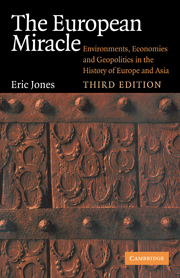Book contents
- Frontmatter
- Contents
- Preface to the third edition
- Preface and acknowledgements
- Introduction to the second edition
- Map
- EURASIA
- 1 Environmental and social conjectures
- 2 Disasters and capital accumulation
- EUROPE
- THE WORLD
- ASIA
- EURASIA
- Afterword to the third edition
- Annotated bibliographical guide to Eurasian economic history in the very long term
- Bibliography
- Supplementary bibliographical guide
- Index
1 - Environmental and social conjectures
Published online by Cambridge University Press: 05 June 2012
- Frontmatter
- Contents
- Preface to the third edition
- Preface and acknowledgements
- Introduction to the second edition
- Map
- EURASIA
- 1 Environmental and social conjectures
- 2 Disasters and capital accumulation
- EUROPE
- THE WORLD
- ASIA
- EURASIA
- Afterword to the third edition
- Annotated bibliographical guide to Eurasian economic history in the very long term
- Bibliography
- Supplementary bibliographical guide
- Index
Summary
We could have left man out, playing the ecological game of ‘let's pretend man doesn't exist’. But this seems as unfair as the corresponding game of the economists, ‘let's pretend nature doesn't exist’. The economy of nature and the ecology of man are inseparable…
Marston Bateseurope did not spend the gifts of its environment ‘as rapidly as it got them in a mere insensate multiplication of the common life’. This phrase from H. G. Wells (in Men Like Gods) sums up the quality of Europeanness. Nevertheless Europe became successful enough biologically to stand third in population in the world after China and India in 1500 and to do proportionately better than they in the period 1650–1850. In total biomass, that is including the weight of domestic livestock, its rank even in 1500 might have been a very close third indeed. Probably the energy output of its population was above third place. In the very long term Europe was economically more successful still. Despite considerable fluctuation, the real wage tended to be high since at least the thirteenth century, compared with India even in the twentieth century (Krause 1973:169). And in its eventual, simultaneous achievement of both biomass gains and real income growth, Europe stood quite alone.
European economic history is a special case of the economic history of all Eurasia, where over three-quarters of the world's population lived and still lives. We may therefore conveniently contrast Europe with the older polities and vaster economies of China and India, the other large societies of the world.
- Type
- Chapter
- Information
- The European MiracleEnvironments, Economies and Geopolitics in the History of Europe and Asia, pp. 3 - 21Publisher: Cambridge University PressPrint publication year: 2003



